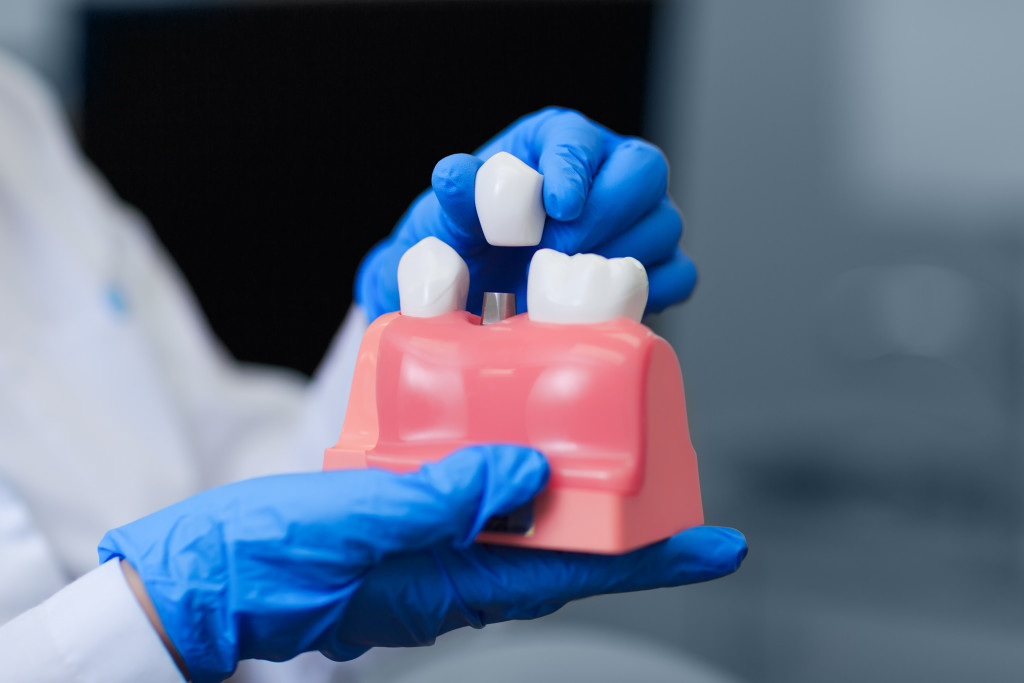Everyone wants a perfect smile. But what does it take to achieve one? Caring for your teeth, crowns, implants, and veneers requires time, effort, and knowledge. In this blog post, we’ll give you the lowdown on how to best take care of your smile so that you can keep it looking its best for years to come.
Why You Should Care for Your Teeth
Having a great smile can do wonders for your confidence. When you know that your teeth look their best, it shows in the way you carry yourself and the way you interact with others. Here are just a few of the many benefits of having great teeth:
- A great smile can make you more attractive to others.
- A great smile can make you feel more confident in social situations.
- A great smile can give you a youthful appearance.
- A great smile can boost your self-esteem.
In contrast, neglecting your teeth can have disastrous results. Not only will your teeth become stained and yellowed, but you’ll also be at risk for cavities, gum disease, and other dental problems. In extreme cases, neglecting your teeth can even lead to tooth loss. Apart from head-splitting tootaches, having bad teeth can severely damage a person’s self-esteem and may also lead to prejudice from other people.
The best way to avoid these problems is to care for your teeth properly every day. By taking care of your teeth, you’ll not only maintain a beautiful smile, but you’ll also keep your oral health in check. So be sure to brush and floss regularly — it’s worth it!
How to Care for Your Teeth
Your teeth are strong and durable, but they’re not indestructible. To keep them healthy and looking their best, you should brush your teeth at least two to three times a day with fluoride toothpaste, floss at least once a day, and visit your dentist regularly for professional cleanings and checkups. Invest in a good toothbrush, such as the Philips Sonicare DiamondClean electric toothbrush or the Smart Oral-B White Pro 1000. Use toothpaste that protects against cavities, such as Colgate Cavity Protection Fluoride Toothpaste, Crest Cavity Toothpaste, or Quip Mint x3 Anticavity Toothpaste.
Most people should visit the dentist every six months for a professional cleaning and checkup. However, if you have diabetes, gum disease, or another chronic illness, you may need to visit more often. If you’re not sure how often you should be seeing the dentist, consult your doctor or dentist for advice.
In addition to daily brushing and flossing, there are a few other things you can do to keep your teeth healthy and looking great. Avoid sugary drinks like soda and juice, which can cause tooth decay. Chew sugarless gum after meals to help increase saliva flow and reduce plaque buildup. And quit smoking, which not only increases your risk of gum and lung disease but also leads to stained teeth. Chewing tobacco has the same effect.

How to Care for Your Crowns
A dental crown is a tooth-shaped cap that’s placed over a tooth to restore its shape and size, strengthen it, and protect it from further damage. Crowns are place on teeth that are broken, severely decayed, or have been damaged by a cavity. Usually, they are attached to dental implants made of metal and look like screws. The implant is placed in the jawbone, and over time, it fuses with the bone. Then a tooth or crown can be attached to the implant.
Crowns are an excellent way to restore the function and appearance of damaged or misshapen teeth. For mose people, a soft-bristled toothbruh and fluoride toothpaste would suffice, just like you would with ordinary teeth. Floss carefully around the base of each crown using an interdental brush or floss threader. And avoid chewing hard foods (ice cubes, hard candy) or using your teeth as tools (to open packages, etc.), which could damage or dislodge your crowns. However, your crowns may require more special treatment. If you have any questions about how to care for your crowns, be sure to ask your dentist during your next appointment. They will be more than happy to give you specific instructions based on the type of crowns you have, especially if you have other oral health problems that need specific care.
How to Care for Your Veneers
Veneers are an excellent way to improve the appearance of stained, chipped, or misshapen teeth. But like all dental appliances, they require special care. Be sure to brush at least twice a day with a soft-bristled toothbrush and fluoride toothpaste. Floss carefully around each veneer using an interdental brush or floss threader. And avoid chewing hard types of food (ice cubes, hard candy) or using your teeth as tools (to open packages, etc.), which could damage or dislodge your veneers.
Final Thoughts
Achieving the perfect smile takes time, effort, and patience. But it’s worth it! By following the tips here, you can keep your teeth healthy and looking their best for years to come.

